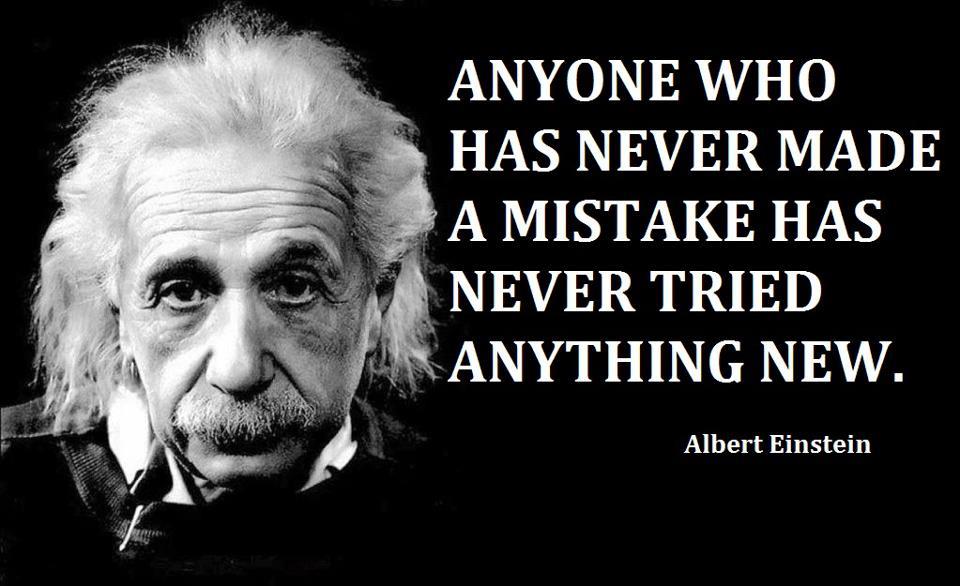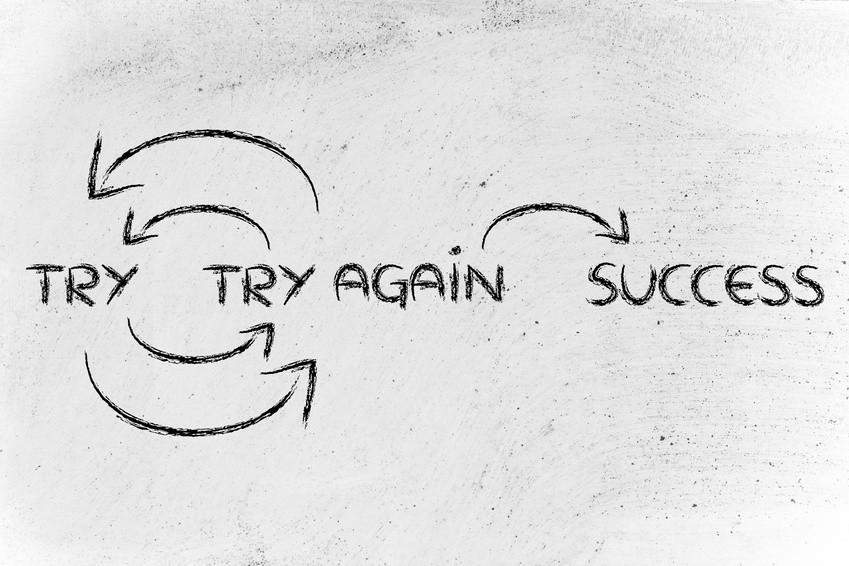5 Learnings from business failure - Business Tips # 1
These are my key learnings from previous business failures that have helped me succeed with the next venture.
In my previous post I asked followers what they thought I should blog about. @captaintj and @unfixable suggested writing about my experience of previous business failures. So, here’s the first post on that subject.
There's a lot to cover here so I’ve tried to keep this to a brief summary with the intention of going into more detail on each topic in later posts.
Introduction
We tend to view failure as a negative. However, successful people recognise that without failure, you can’t learn, grow and ultimately be successful. So we should view failure as an opportunity to learn and improve for the next time.
Steve Jobs founded NeXT Computer in 1985 after being fired from Apple. NeXT wasn’t very successful and Apple later purchased it and brought Jobs back. Not only was he fired from the company he founded, possibly the most brilliant business mind in recent history started a business that essentially failed.
However, this series of failures didn’t derail Jobs, instead it propelled him to further greatness. He faced the same challenges any business owner faces but he chose to turn them into positives.
Now, I’m certainly no Steve Jobs, but I take encouragement from the fact that he learnt from his failures and ultimately became incredibly successful. Trust me, when you are staring down the barrel of failure you are going to need to draw comfort and inspiration from people like Steve Jobs.
Also, remember that building a successful business is hard, very hard. Your chances of success the first time around are low. 9 out of 10 start-ups fail within the first 5 years. However, it is not meant to be easy. If it were easy, everyone would do it!
My advice would be to understand this likelihood of failure and accept that it will most likely happen to you. However, if it does, it won’t be the end unless you let it be. Learn from the experience and take those learnings into your next venture.
Here are 5 key learnings form my previous business failures that have helped me with my latest venture.
1. Solve a problem people can’t do without
My first business was a consultancy business based in Hong Kong. The model centered around advising companies on how to manufacture their products in China (I spent 10 years overseeing production lines in China for major consumer electronics brands). We do everything from initial introductions, reviewing product designs to offering a complete turnkey OEM solution.
Business was great until the 2008 global financial crisis. Then, most of our customers had to cut costs and we were on the nice to have but can’t afford it list.
DON’T BE ON THAT LIST!
In the end we got through it, but we were working very hard just to pay the bills and we couldn’t see how to scale the business in an economic down turn, so we shut it down (see point 5).
Whatever your business idea is make sure that you solve such a strong pain point for your customers that they can’t live without you, even in hard times.
2. Raise enough money
This might seem obvious, but it is easier said than done. No matter what type of venture you start, you are going to need capital. Unless you are fortunate enough to already have the money yourself, you are going to have to raise some.
There are many facets to raising money which I will cover in another post. However, the traditional ways of raising early seed capital are listed below.
- Investment or loans from the ‘3Fs’, Friends, Family and Fools.
- Bank Loans (I wouldn’t recommend this one!)
- Angel Investors
- Project Crowdfunding (e.g. Kickstarter)
- Equity Crowdfunding (e.g. Snowball Effect)
- Customer pre-sales or deposits
- Of course, we now have Initial Coin Offerings (ICOs) as well now.
Right, now you have got your seed capital. Great! Now what?
If you have gotten this far then you have probably drafted an initial business plan (perhaps not with the 3Fs!).
Now this next part is important:
Be clear on what your cash requirements are to get to each major milestone and double or triple it. Remember, shit happens, something will most likely go wrong at some point, so you need to plan for contingencies.
Recognize that you probably won’t raise all of the capital your business will need all in one go. It’s also unlikely that you will hit your sales forecasts exactly how you forecast them. Sometimes it will be higher but usually they are lower! Also, product development ALWAYS takes longer than expected.
For my second venture we were developing a new type of sensor technology which of course took longer than expected. We had raised $100k from the 3Fs and managed to secure $500k from Angel Investors in Singapore in tranches of $100k per defined milestone achieved. Our milestones slipped, and they pulled the last tranche of funding. This was one of the catalysts for the business failing but it wasn’t the only reason (more on that later).
Knowing, now, that you will need to raise capital in stages, plan for it. The 3Fs and Angel Investors can’t take you all the way to business success and riches, but they can help you get there.
As the business grows so does the capital requirements. When looking at Angel Investors ask if they have networks into larger funding pools such as Venture Capital firms that they can access once the business matures. Once you have positive cash flow then go to the bank and see what services they offer such as Trade Loans to cover working capital or invoice factoring. If you are like me and don’t like banks then look at crypto projects such as Salt, or Populous and see what they can offer.
However, you do it make sure you DON’T RUN OUT OF MONEY! When you have no cash flow things grinds to halt real quick. Don’t let that happen to you and don’t get into debt if you get there (see point 5)
3. Build a great team early
You aren’t an expert at everything. In this highly competitive world, trying to be an expert marketer, web designer, manufacturer, manager, sales associate, and accountant isn’t going to work. You have the vison, the passion and the drive for this venture. You will likely have a particular strength such as sales, marketing, design or finance. Focus on that. Then get others to help you execute on everything else.
Now, it’s hard to build a team early when you have no money. It’s also hard to raise money without a great team. Wait? What? Yes, that’s what we call a Catch-22, life and business are full of them. Get used to it.
The good news is, there are some ways around this. Here are some suggestions:
Find some founders that share your vision and passion. You’ll have to give away some equity but now you have more people focused on the business without having to be paid any money, yet.
Look for advisors in key areas. If they are experienced in a particular field they will usually agree to advise you on an equity-based rate. They don’t need to be 100% focused on your business so they will have other income streams.
Strong founders and advisors with expertise in different areas will be viewed very positively by early stage investors as well as prospective channel partners and customers
This was one of the biggest revelations for me when we started Jupl. I was fortunate that Sir Ray Avery was part of the founding team. His high profile gave us access to investment pools that I couldn’t reach but he and I couldn’t do it all, so we assembled a team of software and hardware developers as well as a commercial advisor and investment guru all on an equity basis. Having a talented team and experienced advisors can get you very far early on.
Also, look for investors who can actively add value to the business. This could be anything from governance to business development to providing access to larger pools of money later on.
Hire accountants and lawyers on a per hour basis. This might seem counterintuitive if you are focused on developing and selling your first product, but trust me, getting sound legal and financial advice will save you a lot of pain and money down the line. Plus, potential investors will be encouraged that you have thought of it. Some firms offer discounted rates for start-ups so look for those. You might also be able to get government grants to part fund this.
Get endorsements or testimonials from potential customers or industry thought leaders. Ask them if a potential investor can speak to them. This will give the investor comfort around the viability of your product and market potential.
In your business plan, list out the various team roles and leave them blank if they are not filled yet. At least you’ll demonstrate to investors that you have thought of where the gaps are in your business.
4. Fail Fast
If your product or business is destined for failure because you have the Customer Value Proposition (CVP) wrong, it’s better to find out earlier rather than later. Fail fast, learn and adjust and rinse and repeat until you get it right.
These days there are many tools and ways to do this which I won’t cover here. Instead I recommend you look into the following books.
These books are great for Business to Consumer (B2C) type businesses. If you are selling Business to Business (B2B), especially to larger businesses then I recommend you read Lean B2B
If you’re interested you can check out my interview with the author, Étienne Garbugli here This covers a lot of the experiences we have had to date with Jupl.
5. Know when to let go.
I’m not going to lie. Accepting that your business is doomed for failure sucks…for a while. Guess what though? It’s actually not as bad as you imagine it to be, so long as you do it the RIGHT WAY!
If you take anything away from this post make sure it is this point. This will save you a lot of pain and hardship and put you in good stead for the next venture.
If you have to get out, make sure you get out clean.
You passion and drive are everything in business but don’t let it blind you to the fact that you have read the market or opportunity wrong, this time. If things aren’t going to plan and the feedback from the market is that the CVP is not there recognise it and walk away, cleanly!
- Continually carry out solvency tests of the business. I’d recommend monthly in the early stages but certainly not longer than quarterly.
- Don’t get in to debt
- Don’t exceed your cash runway
- Make sure you pay creditors
- Manage shareholders expectations. This doesn’t have to be the end of the relationship. Bring them along for the next venture and offer them some free equity. That’s what I did and I still have strong support from some of them.
The easiest way to walk away is to put the business into voluntary liquidation. This is a straightforward process so long as you don’t owe any money to creditors, banks and the government (we all know how they feel about their precious taxes!).
There are many risks and pitfalls in business as well as great rewards. Too much to cover here. We will cover more in later posts, but I hope this was a useful summary.
Take care,
Alan
Alan Brannigan
Husband, Father, CEO, Entrepreneur, Tech-Geek, Crypto Enthusiast, Believer in Freedom and Liberty
Email: [email protected]
Steemit - @nalabra







During economic crisis, it is really hard to survive. When we have a business idea, we have to analyze how painful problem we're solving. If it is easily replicated by anyone, we should think twice about that idea.
Thank you so much for your effort to make this awesome post. I'm going to resteem it.
Thanks @rezoanulvibes, much appreciated.
Good stuff!
Interesting to come across this blog post after I just did a Tarot reading for you in your introduction post a few minutes ago where the cards suggested writing about your failures.
The cards also suggested writing about how you turned Sh*t into Gold in your projects... looking forward to those posts. ;)
Thanks for the feedback!
Thanks for telling us how smart, handsome and successful men can create error sometimes!
Thanks @zero-infinity. I make many errors believe me!
Wow I didn't expect such an insightful post! Quality stuff and interesting read with lots of good advice~ thanks for tagging me, I was busy these days so wouldn't have seen it otherwise! Keep going!
Thanks for your encouraging feedback @unfixable. There will be more coming don't worry! If you have any questions or topicd you would specifically want addressed the please let me know.
i love the way you set out your article! also find your information really helpful for the business im starting, i hope my articles look this good on the future
Thanks @bradleyconn. I'm glad you found it helpful
Great stuff nal. I am sure to take this advice to heart.
Thanks, I'm glad you found it useful.